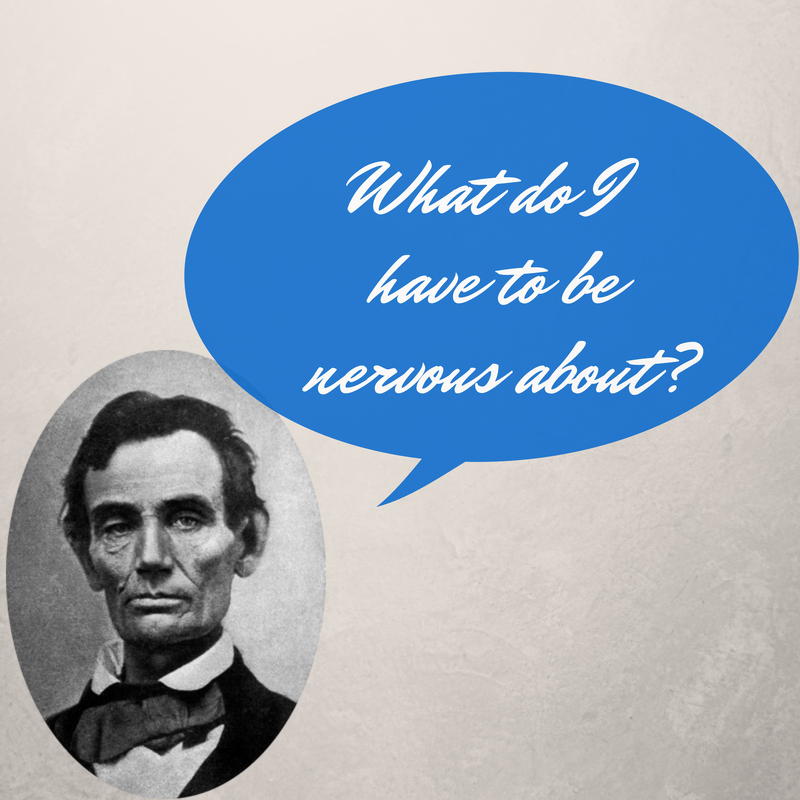
1. Be Yourself!!
People who come to hear your talk are interested in hearing YOU talk. Otherwise they could stay at home and read an article you (or someone else) has written, watch a video on Youtube or seek the relevant information on Wikipedia.
So my first bit of advice is to be YOU. This is not always easy when giving oral presentations. We are so hypercritical of ourselves, so worried that we might appear ridiculous, say the wrong thing, stutter, have a blackout, forget to pull up our zipper (this happened to me once in front of a crowd of 400 ), and so on. Being ‘you’ means being vulnerable. But it is also the first step in presenting an amazing talk.
So the trick is to practice being silly and ridiculous. Once you have mastered the art of being silly, you might realize that it is not so terrible after all.
To practice silliness, I often ask people to…
2. Bark
Stand in front of a mirror. Growl. Bark. Yelp. Bow wow. Go on, be ridiculous. Enjoy yourself!!! It’s amazing how much fun it is, and how much it will help you.
If you have trouble barking aloud, read this children’s book. It’s about learning to be laugh at oneself.
Think back to talks that you have attended. Aren’t serious, stuffy, self-important people the worst lecturers?
At some stage in our lives, everyone is ridiculous. Let’s own up to it, and stop worrying. Accept it. Laugh at yourself a bit. Loosen up. Bark.
When you’re done barking, you’re ready for the next step, which is to be ready to…
3. Be nervous.
Go ahead, be nervous. Everyone is.
It’s okay to be nervous. Being nervous keeps us on edge, on our toes. We are nervous because we want to do our best. That’s great. Even veteran speakers have the jitters before important talks. Some even throw up. That’s okay.
The trick is not to be so nervous that you become catatonic.
Catatonia can occur when you don’t …

4. Prepare your talk.
Unless you are a very seasoned speaker, you should write out your whole talk. You should consider writing multiple drafts to get it as good as you can.
Do the research on your topic. If you are not already an expert, become one. Look for quotations. Seek a few interesting statistics and poignant story. Own your topic.
In your written text, you should start out by briefly telling the audience what you are going to talk about. At the end of your talk, you should summarize. Get your words down on paper. Read your talk to yourself, over and over again. Correct it. Practice in front of friends, a mirror, a ‘go pro’. Prepare yourself. Check the duration (more on that later). This will build confidence, which will calm your nerves.
Learn the text off by heart and then…
5. Forget it.
What? Forget my whole talk? No, I didn’t mean that. What I meant was it’s bad practice to read verbatim or refer to notes. Have a look at a few good TED talks. Noone has texts, or even prompt cards. All the good speakers have memorized their text. But they don’t recite. Good oral presentations sound as though they are fresh and almost extemporaneous. Like a good Jackie Mason joke. Even though he’s told it a thousand times, he still makes it sound likes he’s adlibbing it. For you, his audience. That’s the art of public speaking, in a nutshell.
So know exactly what you are going to talk about, but free your words, let the words flow out. Be yourself, resonate with your audience.
In case you worry about ‘losing your place’ you can bring along physical props that you can share with your audience (the stuffed animal that taught you how to be afraid of the dark). You can also prepare a
6. Slide Presentation
But remember that any slides you show, distract and detract from the star of the show, which is YOU. Three years ago I gave a talk to two hundred professionals, and the slide presentation wouldn’t work. I actually ended up giving a much better talk without the slides.
My advice is to keep the slides simple, and to avoid effects. Use a very LARGE font (bigger than 30), and remember, just a few lines (less than eight) per slides. And yes, just a few slides. Less than you think you need.
Remember that a good oral presentation is a love affair between you and…

7. Your Audience
Try to capture the audience’s attention right at the beginning of your talk. Smile if it comes naturally. Tell a joke if it comes naturally. Tell a personal story to grab their interest.
Look towards your audience, concentrating on just a handful of people around the room. You don’t have to stare at them or focus your gaze on the detail of their faces, just look their way. Again, in a natural way.
Remember, when you look away from your audience, they stop listening.
Project your voice so that everyone can hear you. Now is not the time to be shy or reserved.
After you’ve been talking for a few minutes it’s time to think about…
8. Shifting gears.
People become physically adapted and psychology habituated when the environment is stable and unchanging. In other words, they get bored.
Once every few minutes, you can consider doing something to recapture their attention. Walk a little, change the pitch or intensity of your voice. Perform a magic trick. They will be alert, anticipating what you are going to do next.
Some people pace a bit during their talk. That is good. Some wave their hands a bit and gesticulate. Everything works, as long as it is not in excess and does not distract the audience from what they should be concentrating on. Your presentation.
Soon you will be in the thick of your talk, enthusing the audience, engaging them. You’ll be excited, animated, in the groove. Nothing can stop you now. That’s great as long as you remember to…
9. Finish on time.
Actually a couple of minutes early so that you can answer a question or two. It is impolite to go over time, and sometimes it’s quite rude to go on when other lecturers are waiting. Keep an eye on the clock, pace yourself according to your material (that’s another reason practice is so important). Even seasoned speakers suffer from this major problem. If you run out of time towards the end, you won’t be able to summarize your talk properly.
At the end of the day, in order to deliver a great talk, all you need is..

10. Love.
Love thy subject. An audience loves to love people who love the topic they are discussing.
Try to be as animated throughout your presentation as you would be during a discussion with friends and family, people you love.
If the topic is a subject you’re not in love with, then fall in love with it. Find the juicy tidbits. Discover what is special, avoid what is mundane. To paraphrase the song “If you can’t be with a topic you love, then love the one you’re with”. If the subject of your talk doesn’t interest you, it won’t interest you audience.
Love yourself too. Not too much, though. If you love yourself a bit, the audience will appreciate your self-deprecating humor, your reserved confidence and natural poise and will love you a lot. If you love yourself too much, there won’t be any left to go around.
And finally don’t forget the three “E”s of oral presentation which are:
11. Interest, Enthuse, Engage
If you can interest your audience, great.
If you can enthuse them, get them excited about your topic, even better.
And if you can engage them, they will think about your talk after they’ve gone home, discuss it with their friends, write a post, perhaps even take action. Then you will know that you are a great success!!!
Oh, last thing. You might have noticed that interest begins with an “i” rather than an “e”. You’re right!!
Hey, nobody’s perfect 🙂
And yes, this is a bonus tip. Thanks for noticing!
Thank you for reading my book!
If you like it, you might also want to read other books on the DNA of Success:
Richard Cory and the DNA of Success
http://www.ourboox.com/books/richard-cory-and-the-dna-of-success/
Read more about me and see ALL my books on Ourboox (I have many)
http://www.ourboox.com/community/drmel/
Or even better, create a book of your own!!!
Here is a tutorial to help you get started on your own voyage as an Ourboox contributor!!
http://www.ourboox.com/books/create-a-book-ourboox-video-tutorial/
And finally, you can always write me at
Published: Sep 7, 2014
Latest Revision: Oct 22, 2014
Ourboox Unique Identifier: OB-16687
Copyright © 2014








